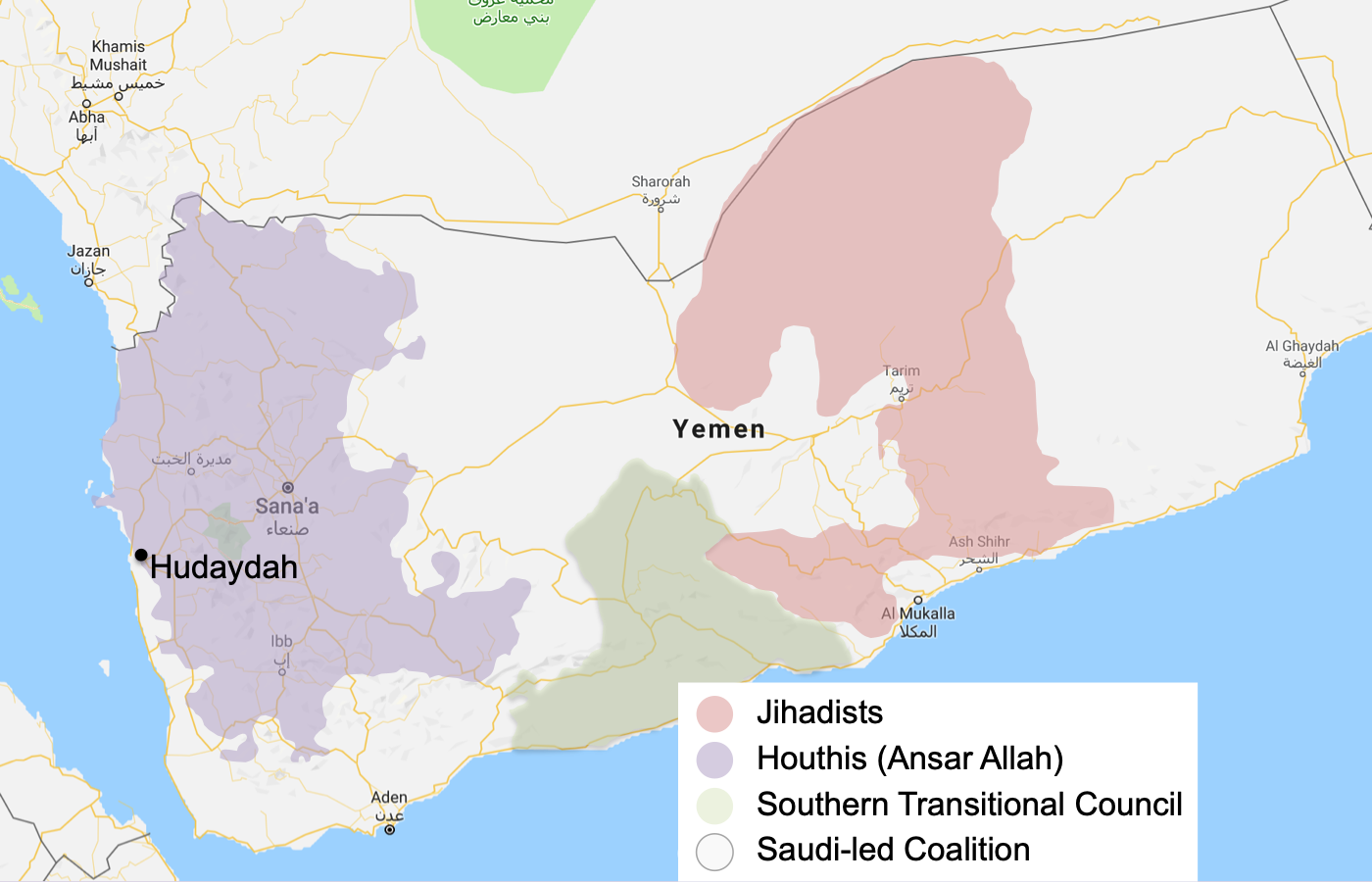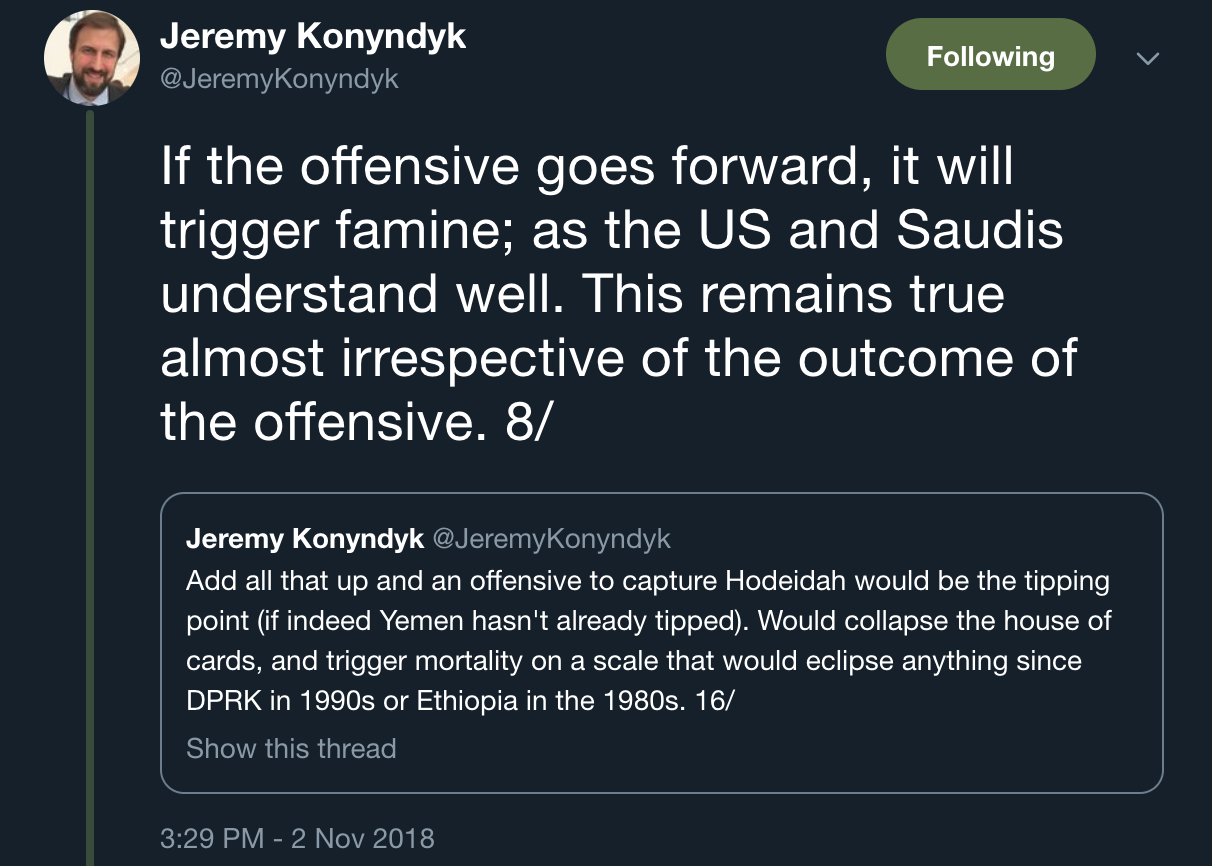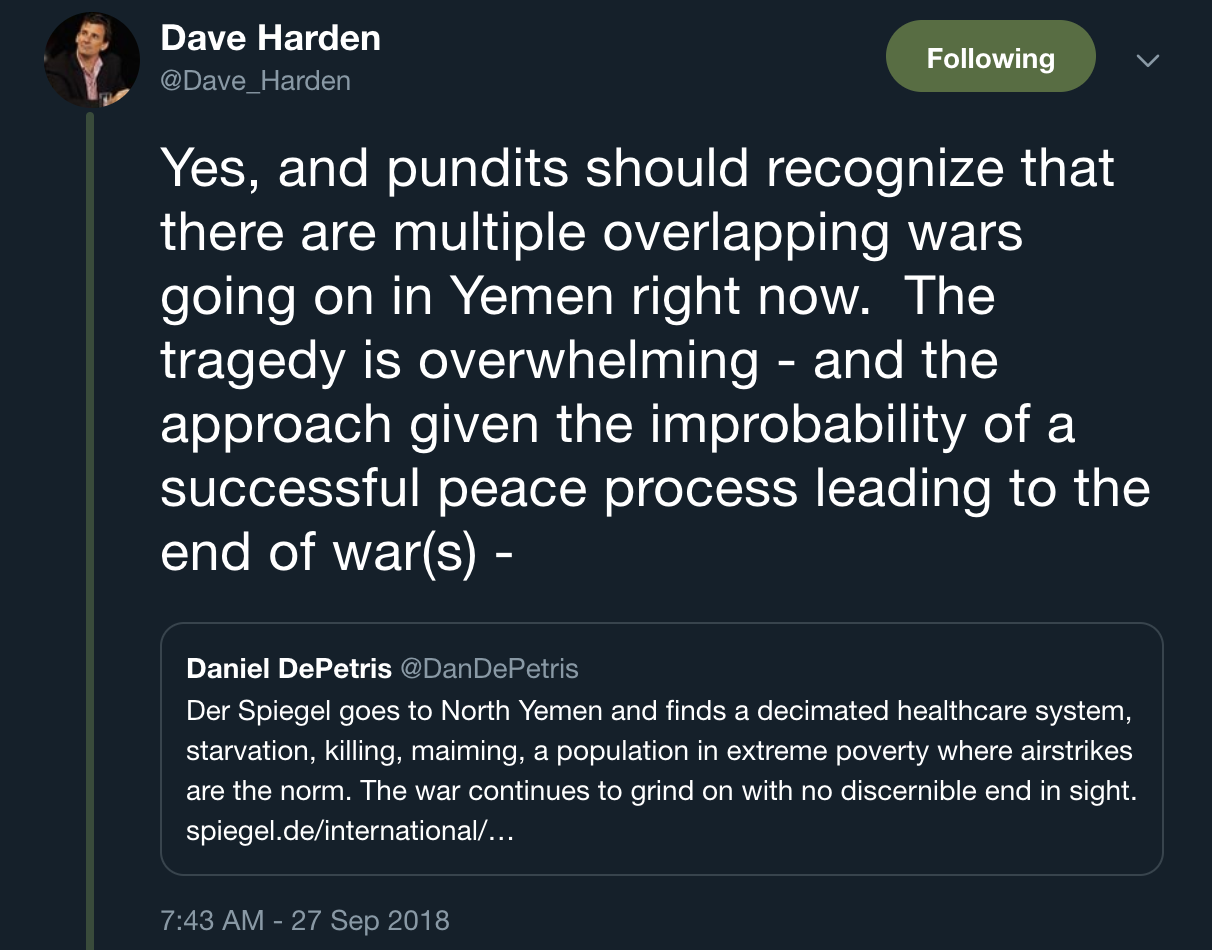On the 21st of March 2019, with a characteristic lack of warning, the President of the United States stunned allies and adversaries alike by announcing — on Twitter — the United States should “fully recognize Israel’s sovereignty over the Golan Heights.” The surprise move reversed 52 years of US policy toward the contested area and prompted emergency meetings in capitals across the globe. Within minutes, a storm of diplomatic protests from around the world reiterated support for a 1981 United Nations Security Council Resolution (UNSCR 497) that specifically rejects an Israeli move to annex the Golan.
Not surprisingly, Syria vowed to retake its strategic terrain by “all means available”, a proclamation vigorously supported by Syria’s traditional backers, Russia and Iran. They were not alone, however. Even America’s allies rejected the move, citing principles of customary international law and warning the President it could decrease stability in the Middle East and have ripple effects elsewhere. As the President tweeted, the Golan Heights is strategically important and its annexation will have strategic consequences.
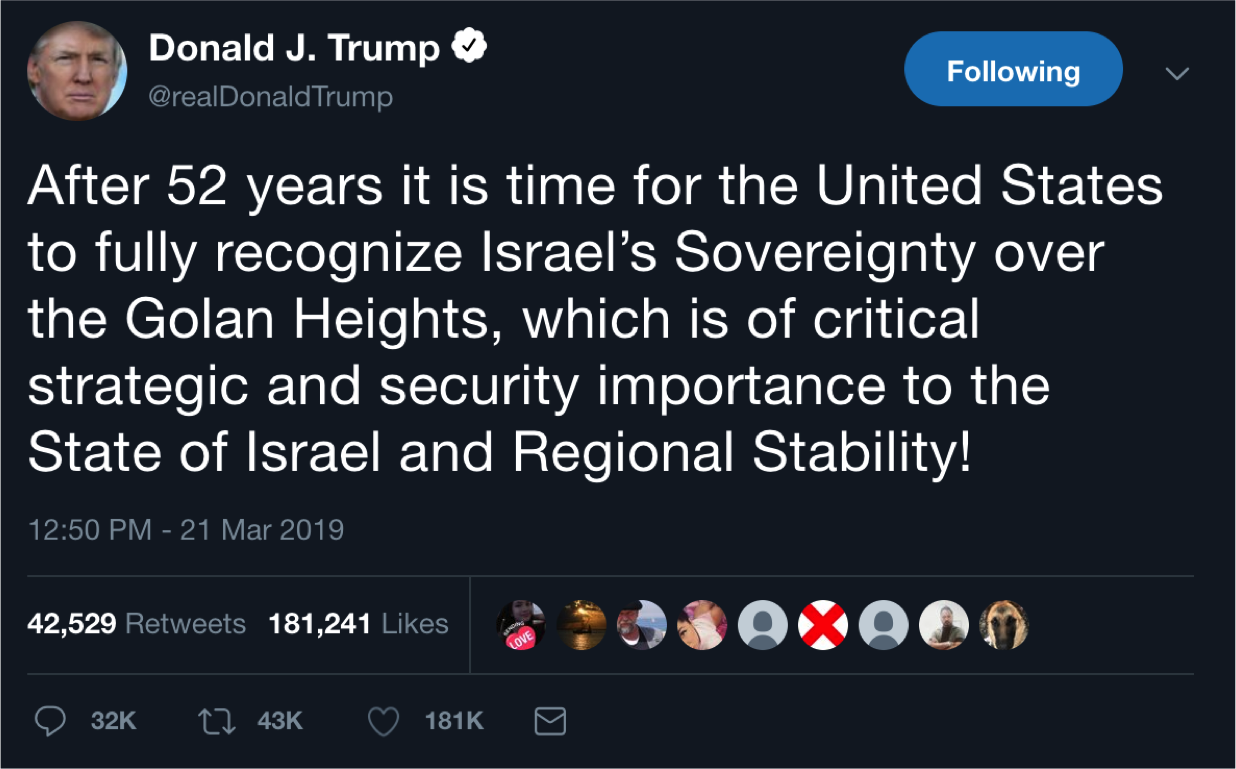
Strategic History
The topography and hydrology of the Golan has divided empires, fixed boundaries, and concentrated warfare since Biblical times. When one considers its history, it is easy to understand the Golan’s intense strategic importance to the security and stability of the greater Middle East. Shaped like a bowl surrounding the Sea of Galilee, the Golan Heights provides a significant percentage of Israel’s fresh water. The terrain feature rises rapidly east from the Sea of Galilee to a ridge that towers 1000 feet over the Transjordanian Plateau and provides a commanding view across southern Syria to the ancient Damascus-Amman Road. Whoever holds the Golan Heights commands all north-south movement in a significant part of the Middle East.
The first Jewish communities settled in the Golan in the 6th Century BCE but later fell under Seleucid rule after the partition of Alexander the Great’s empire in the 3rd Century BCE. The Jews regained their independence after a revolt only to be conquered and crushed by the Roman 10th Legion under Vespasian in the winter of 66 A.D.. After the fall of the Roman Empire, the area changed hands in step with the ebb and flow of fortunes in Constantinople. First the Byzantines, then the Ottomans ruled the Golan until their defeat in the First World War placed the area under the British Mandate. The British ceded it to France a year later and Syria inherited it at the end of the Mandate in 1944.
The British decision to cede the Golan Heights to France left Palestine without a defensible northeastern frontier. When Israel declared independence a few years later, it found itself in a vulnerable position with a modern Arab army in a strong position to threaten Israel’s main source of water. The Six-Day War in 1967 provided the opportunity for Tel Aviv to address the vulnerability by seizing the Golan. At the time, the United States joined the world in calling for an Israeli withdrawal, a policy every President since has supported. When Israel attempted to annex the area in 1981, the Reagan administration went even farther, joining the UN in declaring the move “null and void and without international legal effect.”

Elsewhere Matters
President Trump’s move to recognize Israeli annexation of the Golan Heights is a historically significant break from the policies of every US President since Lyndon Johnson. Though there will be immediate impacts on the stability of the Middle East, international law and the overlapping interests of regional stakeholders will cause ripple effects on US interests in unexpected places.
When Russia employed ‘hybrid warfare’ to invade and annex Crimea in early 2014, the US response was fairly robust and focused. Aside from a frenzy of bilateral military exercises in the Baltic states and Poland, US messaging on the legality of Russia’s move battered Moscow with principles of international law. The United States specifically cited Article 2 of the UN Charter which prohibits the use of force in territorial disputes. More importantly, perhaps, the White House invoked the principle that states have an obligation ‘not to recognize as legal’ the acquisition or occupation of territory resulting from aggression or the threat or use of force. The Obama Administration argued at the time that Crimea was taken by force and therefore the United States had an obligation to reject its annexation by Russia.
Recognition of Israel’s occupation of the Golan Heights effectively abandons this legal principle as a basis for US foreign policy, putting the US position at risk in Crimea and damaging other, longer-term US interests. The occupation of Northern Cyprus for example, seized by Turkey in 1974, is still not recognized internationally. President Trump’s capitulation on the Golan may give Turkey a sense that now is a good time to push for annexation of Northern Cyprus. Timing aside, such a move could threaten peace with Greece and destabilize NATO. Further afield, the principle of non-recognition protected the Baltic states for 51 years and guaranteed support for their independence after the fall of the Soviet Union. Already nervous about Russian territorial ambitions, Baltic leaders are concerned abandonment of the principle now could encourage Russian ambitions in ways detrimental to numerous NATO member states. One can imagine similar issues arising in the South China Sea and the Senkakus, and perhaps even provoking sovereignty questions in US territories conquered during World War II or the Spanish-American War.
Some argue changing the status of the Golan Heights will not significantly affect the situation on the ground. However, the political narrative will have global consequences as states with territorial disputes rush to take advantage of America’s recent flexibility with international law. As the most powerful nation in the world, the United States is the principal benefactor of an international system that affords states a privileged position on questions of sovereignty. Eroding the legal principles that underpin those positions weakens our foreign policy. Doing so in pursuit of short-term gains is the exact opposite of principled action and certainly not the height of strategic thinking.

Lino Miani is a retired US Army Special Forces officer, author of The Sulu Arms Market, and CEO of Navisio Global LLC.



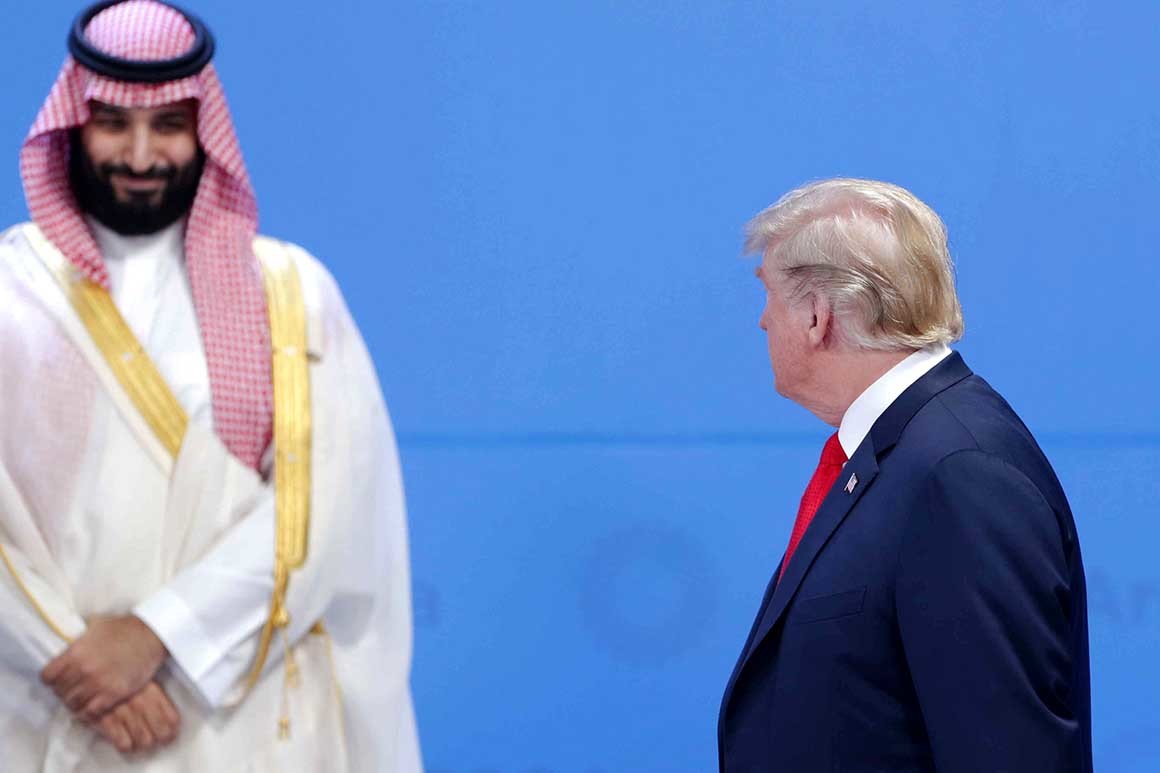
 The views expressed in this article are those of the author and do not reflect the views of any government or private institution.
The views expressed in this article are those of the author and do not reflect the views of any government or private institution.
